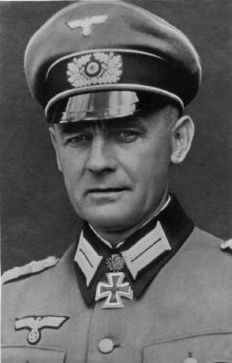Griesbach, Franz
- Date of birth:
- December 21st, 1892 (Brück/Brandenburg, Germany)
- Date of death:
- September 24th, 1984 (Lage/North Rhine-Westphalia, Germany)
- Nationality:
- German
Biography
Promotions:
August 23rd, 1917: Leutnant;
1939: Hauptmann;
August 1st, 1940: Major;
April 1st, 1942: Oberstleutnant;
December 1st, 1942: Oberst;
August 1st, 1944: Generalmajor.
Career:
?: Volksschule,Putlitz, Westprignitz;
1907 - 1910: Präparandenanstalt, Genthin;
1910 - 1913: Lehrerseminar;
April 1st, 1914: Infanterie-Regiment „Prinz Louis Ferdinand von Preußen" (2. Magdeburgisches) Nr. 27;
1920: Lehrerprüfung;
?: Lehrer Sachsen;
March 1st, 1939: Chef 6./Infanterie-Regiment 12, Halberstadt;
? - 1940: Stabsausbildung, Königsbrück;
1940: Kommandeur Infanterie-Ersatz-Bataillon 467;
1940: Chef 10./Infanterie-Regiment 467;
August 1940: Kommandeur Infanterie-Ersatz-Bataillon 467, Blankenburg;
September 15th, 1941: Kommandeur I./Infanterie-Regiment 391/170. Infanterie-Division;
April 17th, 1942: Kommandeur Infanterie-Regiment 399;
February 15th, 1944: Führer 170. Infanterie-Division (m.d.F.b.);
February 16th, 1944 - April 1945: Reservelazerett Görden;
April 1945 - October 21st, 1949: Soviet POW.
Do you have more information about this person? Inform us!
- Period:
- Second World War (1939-1945)
- Rank:
- Major
- Unit:
- Kommandeur, I. Bataillon, Infanterie-Regiment 391, 170. Infanterie-Division, Heer
- Awarded on:
- October 22nd, 1941
Had already received the Iron Cross 2nd Class on Dcember 22nd, 1914.
- Period:
- Second World War (1939-1945)
- Rank:
- Major
- Unit:
- Kommandeur, I. Bataillon, Infanterie-Regiment 391, 170. Infanterie-Division, Heer
- Awarded on:
- November 22nd, 1941
Had already received the Iron Cross 1st Class on August 23rd, 1917.
- Period:
- Second World War (1939-1945)
- Rank:
- Major
- Unit:
- Kommandeur, I. Bataillon, Infanterie-Regiment 391, 170. Infanterie-Division, Heer
- Awarded on:
- March 14th, 1942
- Period:
- Second World War (1939-1945)
- Rank:
- Oberst (Colonel)
- Unit:
- Kommandeur, Grenadier-Regiment 399, 170. Infanterie-Division, Heer
- Awarded on:
- May 17th, 1943
“The Oberst was in the Thick of It:
As was just recently reported, Oberst Franz Griesbach was awarded the Oakleaves. His decisive feat-of-arms was the sealing off of a deep enemy penetration south of Lake Ladoga. We know the following concerning this action;
Oberst Griesbach launched an assault operation that demonstrated that, although the Soviets may be superior in numbers, they’re much more lacking in the realm of actual combat ability. This deliberate counterattack was initiated on the Oberst’s own initiative and conducted with the battle-weary troops of his III. Bataillon. In the combat which followed the commander fought at the spearhead of the foremost Kompanie, crushing one resistance nest after another and directing his shock troops and artillery observer onto appropriate targets. He was also the first to experience the enemy’s blocking fire. After more than half of the penetration area had been recaptured after a five-and-a-half hour battle he moved to the sector of his I. Bataillon, which was positioned on the Bolsheviks’ right flank. With these men he launched a surprise onslaught against the enemy without any artillery preparation. It was not long before he and his troops succeeded in entering the positions of the Soviets, who now found themselves pushed into an ever more narrow space in-between the two German Bataillonen. They suffered extremely heavy casualties as a result, with about 2000 dead Bolsheviks remaining on the battlefield once hostilities had ceased. 338 prisoners were taken, while 5 tanks, 24 artillery pieces and 149 mortars/machine-guns were either destroyed or captured. This victory was mentioned in the Wehrmachtbericht of the 25.03.1943.”
The Soviet penetration mentioned in the article took place near Krasny Bor, and before Griesbach launched his counterattack it had reached a depth of 2 km.
242nd Award.
- Period:
- Second World War (1939-1945)
- Rank:
- Oberst (Colonel)
- Unit:
- Kommandeur, Grenadier-Regiment 399, 170. Infanterie-Division, Heer
- Awarded on:
- March 6th, 1944
53rd Award.
- Period:
- Second World War (1939-1945)
- Period:
- Second World War (1939-1945)
- Period:
- Second World War (1939-1945)
- Period:
- Second World War (1939-1945)
- Period:
- Second World War (1939-1945)
- Period:
- Second World War (1939-1945)
- Period:
- Second World War (1939-1945)
- Period:
- Second World War (1939-1945)
Sources
- Photo 1: Wilco Vermeer
- - FELLGIEBEL, W.P., Elite of theThird Reich, Helion & Company Limited, Solihull, 2003.
- THOMAS, FRANZ & WEGMANN, GüNTER, Die Eichenlaubträger 1940-1945, Biblio-Verlag, 1997.
- Otto von Guericke Univ. Magdeburg
- Die träger des Ritterkreuzes des Eiserne Kreuz 1939 - 1945
- Die Ritterkreuztraeger der Deutschen Wehrmacht und Waffen-SS
- Lexikon der Wehrmacht
- Die Grenz-Zeitung (Edition 146/147).
















